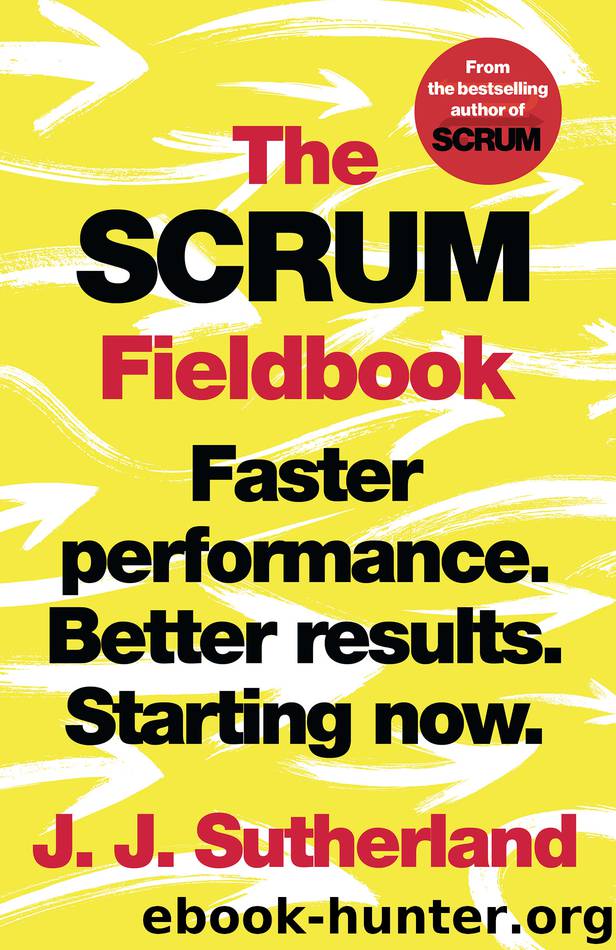The Scrum Fieldbook by J.J. Sutherland

Author:J.J. Sutherland
Language: eng
Format: epub
ISBN: 9781473573581
Publisher: Random House
An Unfortunate Peculiarity of the Human Psyche
We are all liars. We all lie. But not all of us lie all the time. There is some fascinating research showing that most adults don’t tell that many lies. The number you often hear is that on average people tell one to two lies a day. But remember, that’s the average. The distribution of lies is interesting: about half the lies are told by 5 percent of the people. Sixty percent of people don’t report telling any lies at all in any particular twenty-four-hour period.
But that’s the average day. In certain situations, almost all of us lie. In job interviews, one study showed that 90 percent of people lie. It might not be an outright lie—maybe it’s just a shading of the truth here and there—but there is a conscious attempt at deception. Adolescents, that pack of liars, 82 percent say they’ve lied to their parents on at least one of six topics: money, alcohol and drugs, friends, dating, parties, and sex. Infidelity? Whew, do cheaters lie— it’s kinda the whole thing. Ninety-two percent of us, when asked anonymously, report lying to a current or past sexual partner. And I kinda figure that the other 8 percent are lying about their lying.
Here’s the thing about lying: the very act of telling a lie changes us. Our neurochemistry shifts with every deceit. A few scientists from Duke University and University College London decided to find out what happens inside our brains when we lie. They put people into an fMRI machine and had them play a game where they lied to their partner. The first time people told a lie, our old friend the amygdala weighed in. It released chemicals that give us that familiar fear, that sinking sense of guilt we get when we lie.
But then the researchers went one step further. They rewarded people for lying. They gave them a small monetary reward for deceiving their partner without them knowing they’d been lied to. Once people started getting rewarded for lying and not getting caught, that amygdala-driven sense of guilt started to fade. Interestingly, it faded most markedly when the lie would hurt someone else but help the person telling it. So people started telling more and more outlandish lies—the whole “slippery slope” thing.
The researchers summed up their findings in a paper called “The Brain Adapts to Dishonesty,” and concluded:
The results show the possible dangers of regular engagement in small acts of dishonesty, perils that are frequently observed in domains ranging from business to politics and law enforcement. These insights can have implications for policy makers in designing deterrents to halt deceit. Despite being small at the outset, engagement in dishonest acts may trigger a process that leads to larger acts of dishonesty further down the line.2
Download
This site does not store any files on its server. We only index and link to content provided by other sites. Please contact the content providers to delete copyright contents if any and email us, we'll remove relevant links or contents immediately.
| Bookkeeping | Business Mathematics |
| Business Writing | Communications |
| Decision Making | Negotiating |
| Project Management | Running Meetings & Presentations |
| Secretarial Aids & Training | Time Management |
| Training |
Nudge - Improving Decisions about Health, Wealth, and Happiness by Thaler Sunstein(7707)
Deep Work by Cal Newport(7083)
Principles: Life and Work by Ray Dalio(6449)
The Doodle Revolution by Sunni Brown(4761)
Factfulness: Ten Reasons We're Wrong About the World – and Why Things Are Better Than You Think by Hans Rosling(4742)
Eat That Frog! by Brian Tracy(4540)
Thinking in Bets by Annie Duke(4227)
Hyperfocus by Chris Bailey(4118)
Visual Intelligence by Amy E. Herman(3782)
Writing Your Dissertation in Fifteen Minutes a Day by Joan Bolker(3729)
Ogilvy on Advertising by David Ogilvy(3622)
Hidden Persuasion: 33 psychological influence techniques in advertising by Marc Andrews & Matthijs van Leeuwen & Rick van Baaren(3565)
How to Win Friends and Influence People in the Digital Age by Dale Carnegie & Associates(3562)
How to win friends and influence people by Dale Carnegie(3474)
The Pixar Touch by David A. Price(3439)
Schaum's Quick Guide to Writing Great Short Stories by Margaret Lucke(3381)
Deep Work: Rules for Focused Success in a Distracted World by Cal Newport(3237)
Work Clean by Dan Charnas(3123)
The Slow Fix: Solve Problems, Work Smarter, and Live Better In a World Addicted to Speed by Carl Honore(3009)
